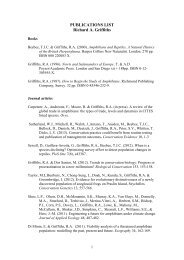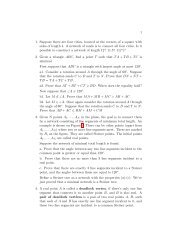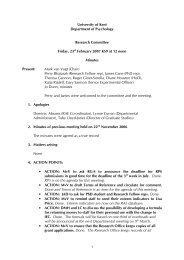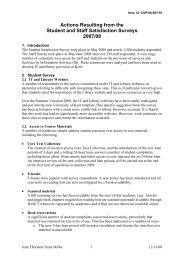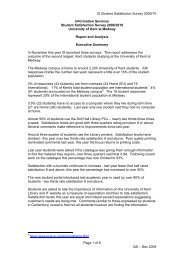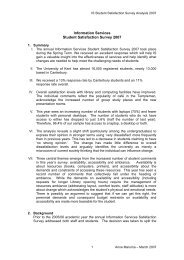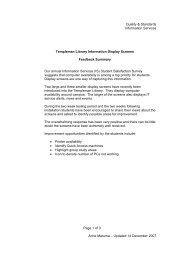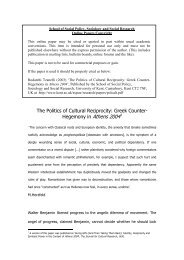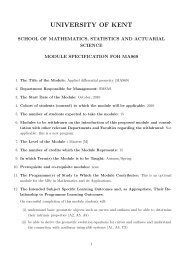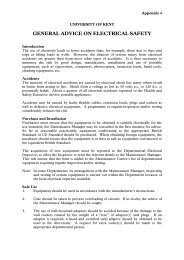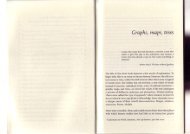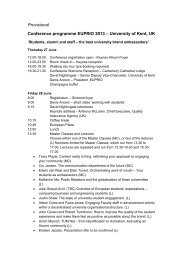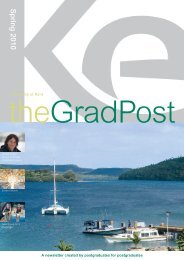Spring 2004 - University of Kent
Spring 2004 - University of Kent
Spring 2004 - University of Kent
Create successful ePaper yourself
Turn your PDF publications into a flip-book with our unique Google optimized e-Paper software.
Letter from<br />
Madrid<br />
JONATHAN RAY K82<br />
PA Photos<br />
DEATH IN THE MORNING<br />
We arrived at Atocha station in Madrid<br />
at 7.25 am, groggy and hungover from a<br />
night on the town. I was accompanying<br />
a party <strong>of</strong> British chefs from restaurants<br />
such as Nobu and Le Manoir aux Quat’<br />
Saisons on a culinary visit to Spain.<br />
Including our hosts and PR representatives, we<br />
numbered 17, one <strong>of</strong> whom was running late.<br />
We made our way downstairs to the level<br />
above the platforms and hung around<br />
grumbling about the early start. Eventually the<br />
latecomer joined us.<br />
Due to catch the 8am express to Seville, we<br />
now had about 20 minutes in which to grab<br />
a c<strong>of</strong>fee and lug our suitcases downstairs. But<br />
for our latecomer, we would already have<br />
been on the platform.<br />
until we were outside that we began to grasp<br />
the enormity <strong>of</strong> what had happened.<br />
Ambulances, police cars and fire engines<br />
thronged the road as <strong>of</strong>ficers put up security<br />
tapes. Frustrated travellers packed away their<br />
mobiles and walked smartly in the direction<br />
indicated. There seemed to be no panic,<br />
rather a sense <strong>of</strong> resignation.<br />
Then there was a shout, and instantly the<br />
crowd ran, as one, away from the station. An<br />
elderly lady with no shoes and her trousers in<br />
rags, blood pouring from a gash over her<br />
eyebrow, was being helped by a young man.<br />
She looked remarkably unconcerned. Behind<br />
me a woman was in tears, shrieking into her<br />
mobile, while beside her a young bloodspattered<br />
couple ran with their arms around<br />
each other. I was carrying two bags and was<br />
walking at the back rather than running, partly<br />
7.39am<br />
because as a journalist I thought I ought to<br />
At 7.39 am there was an enormous ‘carrump,’<br />
followed by a slight aftershock. One <strong>of</strong> our<br />
party muttered half to himself, ‘that sounded<br />
like a bomb,’ but nobody seemed too<br />
concerned. Not thinking, two <strong>of</strong> us strolled<br />
closer to the windows overlooking the tracks<br />
for a better look. Two more smaller ‘carrumps’<br />
and we still didn’t take in what was happening.<br />
I went to get a newspaper.<br />
Suddenly a couple <strong>of</strong> policemen dashed past<br />
us, and the newsvendor grabbed the paper in<br />
my hand with a cry and slammed down his<br />
shutter. Moments later a young lad was<br />
brought up the stairs by an <strong>of</strong>ficer who was<br />
gripping his arm. He was holding his head with<br />
his free hand and I thought that he had been<br />
arrested, but as he turned I saw that his left<br />
ear and neck were gushing with blood.<br />
Gradually it dawned on me that things didn’t<br />
look too good.<br />
No alarms or sirens went <strong>of</strong>f in the station, but<br />
a policewoman shouted at us to evacuate. This<br />
everyone did at a leisurely pace and it wasn’t<br />
<strong>University</strong> students from the southern Spanish city <strong>of</strong> Jerez placed 190 white masks on Friday, 26<br />
March <strong>2004</strong>, at a makeshift shrine in the Atocha train station in Madrid, Spain, in memory <strong>of</strong> those<br />
killed in the series <strong>of</strong> terrroist bombings on packed communter trains on 11 March. Two <strong>of</strong> the four<br />
trains attacked that day were arriving at Atocha when the bombs exploded. The students used their<br />
own faces to mold the masks.<br />
hang around, and partly because an army<br />
friend <strong>of</strong> mine had once told me that<br />
secondary bombs were <strong>of</strong>ten planted in the<br />
path <strong>of</strong> a fleeing crowd.<br />
11 March<br />
Amazingly in this crush <strong>of</strong> many hundreds,<br />
our party managed to find a quiet corner and<br />
regrouped. We were all talking at once and<br />
shaking from the adrenalin. Most <strong>of</strong> us were<br />
calm, although some were pale and unsteady.<br />
One <strong>of</strong> the chefs in particular was very<br />
wobbly.<br />
<strong>2004</strong><br />
Seville. Reports <strong>of</strong> what had happened began<br />
We decided to split into small groups and go<br />
to the airport, determined still to get to<br />
to filter through. Some thought a train had<br />
overshot the station; others that there had<br />
been a gas explosion, but most were<br />
convinced it was a bomb. Five people were<br />
declared dead. No 2, no 15, 40, 100. The<br />
number kept rising. I called my wife in England.<br />
‘I’m sorry, darling,’ she said, ‘ the baby’s crying.<br />
I’ll have to call you back.’ An hour later she did<br />
so and, having now seen the BBC news, she<br />
was worried.<br />
At the airport we found that flights to Seville<br />
were fully booked, and were put on a waiting<br />
list. Within the hour, though, we were<br />
allocated seats on the first flight, several <strong>of</strong> the<br />
expected passengers no doubt having<br />
perished or been injured by the bombs. To<br />
our consternation, there was little evidence <strong>of</strong><br />
security at the airport. When I went through<br />
the X-ray machine the ping went <strong>of</strong>f, and<br />
when I pointed to my mobile, the guard<br />
waved me through with a grin. We arrived in<br />
Seville a little after midday and watched as<br />
several passengers were greeted by weeping<br />
relatives.<br />
During a two-hour bus ride through the<br />
Andalusian countryside, we gleaned more<br />
about the morning’s events from calls on our<br />
mobiles, and delayed shock began to set in.<br />
But later, as we stood in a lush green meadow<br />
while a farmer drove his pedigree Iberian pigs<br />
towards us, some <strong>of</strong> us wondered whether<br />
the sickening events <strong>of</strong> the morning had really<br />
happened. We felt far removed from the<br />
horrors <strong>of</strong> Madrid.<br />
The day took on an even more surreal hue as<br />
the farmer’s young son, Pedro, picked up one<br />
<strong>of</strong> the smallest piglets and handed it to one <strong>of</strong><br />
our chefs. He cradled the little chap in his<br />
arms and turned to us with tears in his eyes<br />
but laughter in his voice, saying, ‘Hey, guys, this<br />
is life’, before reluctantly passing the piglet on.<br />
Each <strong>of</strong> us in turn demanded to have our<br />
photograph taken with it.<br />
This article was adapted from the original<br />
published in The Spectator.<br />
19



